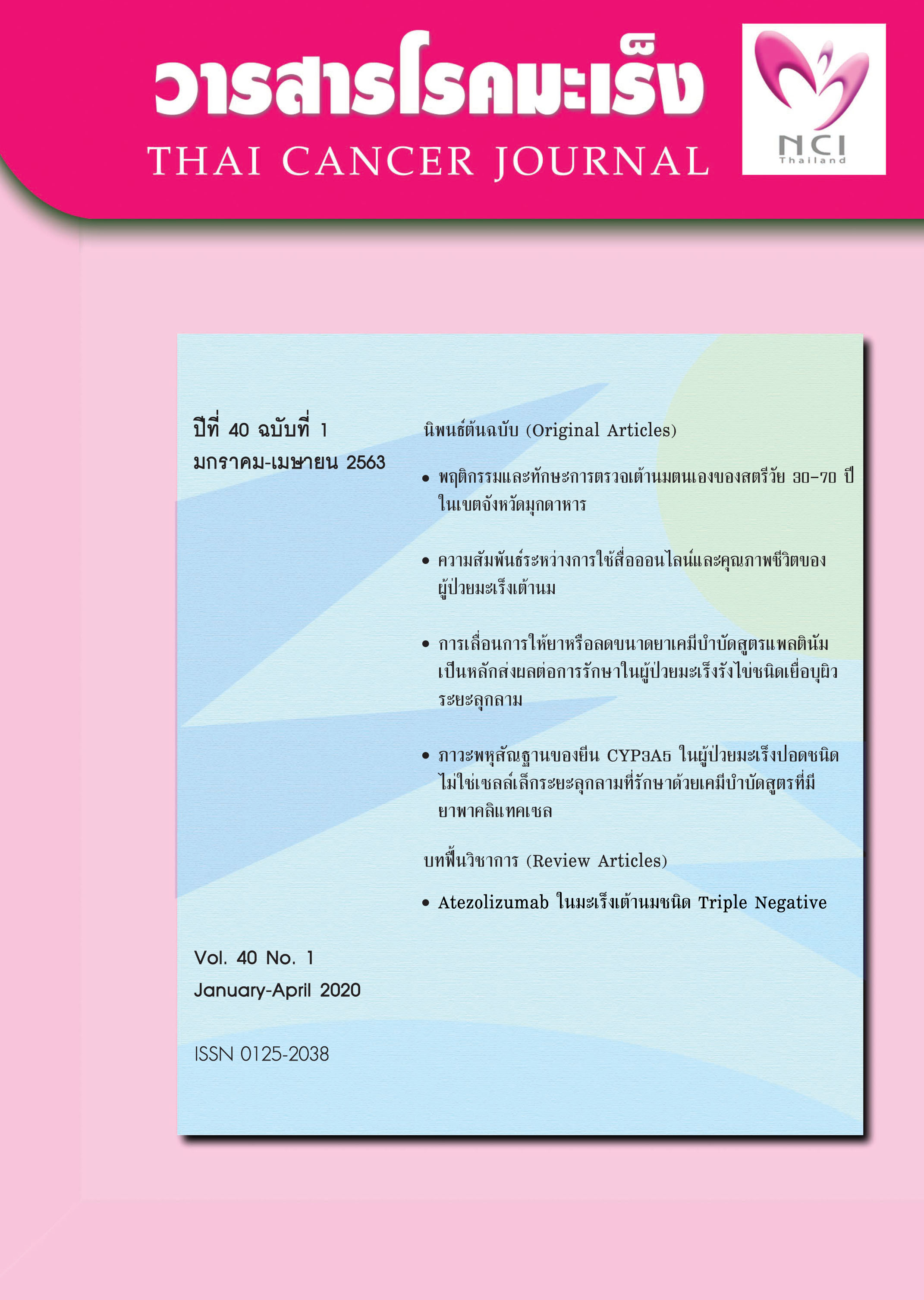Impact of Delays or Dose Reduction of Platinum-based Chemotherapy on Patients with Advanced Epithelial Ovarian Cancer
Keywords:
epithelial ovarian cancer, chemotherapy, platinumsAbstract
Platinum-based chemotherapy is the standard treatment for epithelial ovarian cancerpatients, either in early stage or in recurrent and advanced diseases. Althoughit is highly effective,
adverse effects, especially bone marrow suppression lead to delays or dose reduction of chemotherapy
which might impact on the treatment outcomes. This study aimed to discover the impacts
of platinum-base chemotherapy delay or dose reduction on treatment outcomes of patients with
advanced epithelial ovarian cancer. We did the prospective study at the outpatient’s day care
during May to September 2018. Fifty-two patients with age range from 35 to 85 years old (average
55.7 ± 10.5), were given 310 cycles of chemotherapy. There were 31 patients (59.6%) with delay of
51 doses (16.4%) of their chemotherapy. The most frequent cause of chemotherapy delay was neutropenia which found in 28 (90.4%) of patients. Eleven patients (21.1%) needed for the
chemotherapy dose reduction. Neutropenia was also the most frequent cause of the dose reduction
found at 72.7%. Patients under the age of 60 had trend of higher rate of delay chemotherapy
(69.7% vs 42.1%, P = 0.078), while no other factors associated with the chemotherapy dose
reduction. In short term assessment, delay or dose reduction of chemotherapy were not associated
with the treatment responses. Only the debulking status was associated with the treatment
responses. Only patients with complete or optimal debulking status were found response to the
treatment compare with the groups with suboptimal or inoperable diseases (100 vs 77.8 and 50.0%
respectively, P=0.003). In conclusions, delay or dose reduction of platinum-based chemotherapy
were found in more than half of the patients. The Major cause was neutropenia. However, delays
or dose reduction of the chemotherapy were not associated with the short-term treatment
responses. Patients’ survival should be monitor to evaluate the impacts on delays or dose reduction
of the chemotherapy.
References
Coburn SB, Bray F, Sherman ME, Trabert B. International
patterns and trends in ovarian cancer incidence,
overall and by histologic subtype. Int J Cancer
;140:2451-60.
Bray F, Ferlay J, Soerjomataram I, Siegel RL, Torre LA,
Jemal A. Global cancer statistics 2018: GLOBOCAN
estimates of incidence and mortality worldwide for
cancers in 185 countries. CA Cancer J Clin
;68:394-424.
Ledermann JA, Raja FA, Fotopoulou C, Gonzalez-
Martin A, Colombo N, Sessa C, et al. Newly diagnosed
and relapsed epithelial ovarian carcinoma: ESMO
Clinical Practice Guidelines for diagnosis, treatment
and follow-up. Ann Oncol 2013;24 suppl 6:vi24-32.
Shimokawa M, Kogawa T, Shimada T, Saito T, Kumagai H,
Ohki M, Kaku T. Overall survival and post-progression
survival are potent endpoint in phase III trials of
second/third-line chemotherapy for advanced or
recurrent epithelial ovarian cancer. J Cancer
;9:872-9.
Chirivella I, Bermejo B, Insa A, Perez-Fidalgo A,
Magro A, Rosello S, et al. Impact of chemotherapy
dose-related factors on survival in breast cancer
patients treated with adjuvant anthracycline-based
chemotherapy. J Clin Oncol 2006;24(18_suppl):668.
Crawford J, Denduluri N, Patt D, Jiao X, Morrow PK,
Garcia J, et al. Relative dose intensity of first-line
chemotherapy and overall survival in patients with
advanced non-small-cell lung cancer. Supportive
Care Cancer 2020;28:925-32.
Aspinall SL, Good CB, Zhao X, Cunningham FE,
Heron BB, Geraci M, et al. Adjuvant chemotherapy
for stage III colon cancer: relative dose intensity and
survival among veterans. BMC Cancer 2015;15:62.
Bandera EV, Lee VS, Rodriguez-Rodriguez L, Powell
CB, Kushi LH. Impact of Chemotherapy Dosing on
Ovarian Cancer Survival According to Body Mass
Index. JAMA Oncol 2015;1:737-45.
Joseph N, Clark RM, Dizon DS, Lee MS, Goodman
A, Boruta D Jr, et al. Delay in chemotherapy
administration impacts survival in elderly patients
with epithelial ovarian cancer. Gynecol Oncol
;137:401-5.
ชวัญญา ระบิลทศพร. ผลของการรักษาแพทย์ทางเลือกที่
มีต่อการเลื่อนและ/หรือการลดขนาดยาเคมีบำบัดในผู้
ป่วยโรคมะเร็งเต้านมและมะเร็งปอดและมะเร็งลำไส้ใหญ่
ของรพ.จฬุ าลงกรณ์ (วิทยานิพนธ์ปริญญาโท). จุฬาลงกรณ์
มหาวิทยาลัย; 2557.
อภิชญา ลือพืช, ขวัญจิต ด่านวิไล. อุบัติการณ์และปัจจัย
เสี่ยงต่อการเกิดภาวะเม็ดเลือดขาวนิวโทรฟิลต่ำในผู้ป่วย
มะเร็งเต้านมที่รับยาเคมีบำบัดทางหลอดเลือดดำ ณ
โรงพยาบาลจุฬาลงกรณ์. วารสารเภสัชกรรมไทย
;9:180-91.
นัตยา บัวทุม, สุทธิดา อินทรบุหรั่น. ความชุกของภาวะเม็ด
เลือดขาวนิวโทรฟิลต่ำหลังให้ยาเคมีบำบัด แพ็คลิแท็กเซล
ร่วมกับคาร์โบพลาตินในผู้ป่ วยมะเร็งรังไข่ชนิดเยื่อบุผิว
ในโรงพยาบาลพระมงกุฎเกล้า. เวชสารแพทย์ทหารบก
;68:11-6.
Vasey PA, Jayson GC, Gordon A, Gabra H, Coleman
R, Atkinson R, et al. Phase III randomized trial of
docetaxel–carboplatin versus paclitaxel–carboplatin
as first-line chemotherapy for ovarian carcinoma.
J Natl Cancer Inst 2004;96:1682-91.
du Bois A, Lück HJ, Meier W, Adams HP, Möbus V,
Costa S, et al. A randomized clinical trial of cisplatin/
paclitaxel versus carboplatin/paclitaxel as first-line
treatment of ovarian cancer. J Natl Cancer Inst
;95:1320-9.
Chang SJ, Hodeib M, Chang J, Bristow RE. Survival
impact of complete cytoreduction to no gross residual
disease for advanced-stage ovarian cancer: a metaanalysis.
Gynecol Oncol 2013;130:493-8.
Hanna RK, Poniewierski MS, Laskey RA, Lopez MA,
Shafer A, Van Le L, et al. Predictors of reduced
relative dose intensity and its relationship to mortality
in women receiving multi-agent chemotherapy for
epithelial ovarian cancer. Gynecol Oncol 2013;129:
-80.
Downloads
Published
Issue
Section
License
บทความทีตีพิมพ์ในวารสารโรคมะเร็งนี้ถือว่าเป็นลิขสิทธิ์ของมูลนิธิสถาบันมะเร็งแห่งชาติ และผลงานวิชาการหรือวิจัยของคณะผู้เขียน ไม่ใช่ความคิดเห็นของบรรณาธิการหรือผู้จัดทํา







